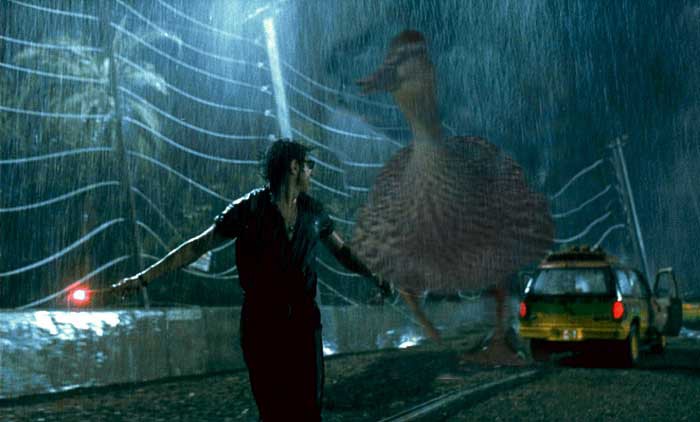Why marketers need to become inventors

Dear Marketers,
We’re doing it wrong.
Online ads, social media and marketing automation…we’ve tried it all.
But to really outpace our competitors we need to invent. We must invent. For it’s in invention that we achieve that burst of pace that leaves our competition behind.
We’re begging for our customers’ and supporters’ attention. Shouldn’t we reward them with great and unusual ideas and experiences, instead of yet another zippy car swooping down rain-slicked roads?
We must invent remarkable ways to market. Here’s why and how.
Marketing by Skynet
In 2002, after three years as an indifferent technical writer, I moved over to marketing. I was grateful for the change — the work was more creative and challenging. I was working at an Internet infrastructure startup and so I spent a lot of time watching and working on the Web. And I started getting worried.
I became convinced that the Web would kill marketing. Recommendation engines, crowdsourced reviews, bots and unimaginable future tech would deliver exactly what each of us wanted, exactly when we wanted it. Our attention would become perfectly attenuated to our heart’s desires. Marketers would never be able to promote a product to anyone, because the Web would outflank them by automagically reducing the crowd down to audience segments of one.
I was foolish to worry. Just today, Google and Facebook showed me one ad for diapers and another for Crocs, in German. I have no children and Ich spreche kein Deutsch.
My post-marketing Internet hasn’t become a reality, but we are working on removing humans from marketing. Bots are already pretty good at writing online ads, and before long they’ll be writing our brochure copy and media releases too. Within a decade, we’ll be adding copywriters and PR flacks to the long list of workers being automated out of a job.
Automation will level the playing field among competitors. How will you beat your competitors when you’re all using the same algorithm to write web copy? Rebranding marketers as ‘growth hackers’ ain’t gonna cut it.
Everyone’s reading the same tips
I like to think my friend Roland invented content strategy in the early 2000’s when he described his Four C’s: create compelling content constantly. Content strategy has, of course, been added to our long list of online marketing activities — media relations, SEO, email marketing, social media and so forth — that everyone does. We have to do these things just to keep up with our competitors. I call these ongoing daily marketing activities “heartbeats,” because they’re constant, reliable and they keep an organization’s outreach alive.
Here’s the thing: even if you hire great people and you and your team adhere to all the best practices and latest tips and tricks, you’ll only beat your competitors by a little. That’s because they’re following all the same tips and tricks. And they’re coming for you.
The Canterbury Tales of memes
About 15 years ago, I wasted too much time in an online community called Fark. Fark was an early home to Photoshop contests, where the site’s editors posted photos and challenged users to modify them in fun, creative ways.These kinds of contests are still popular today. This was social media and crowdsourcing before Facebook and Twitter, and before we exhausted the meaning of those phrases.
I was lousy at Photoshop, so I rarely participated. Instead I played armchair Internet sociologist and studied what was most successful in these contests. In Internet years, these were the Middle Ages and the contests were The Canterbury Tales of memes.
I made a number of obvious observations about the popularity of dick jokes and twists on pop culture. But the most valuable insight I gleaned was this:
Funny and inventive beats slick and pretty every time.
You still see this across today’s web in basement YouTube rants, grainy GIFs and jittery Snapchat videos.
You didn’t need to be around during the dawn of the Internet to understand nuances of the digital space. But, you do need to spend your days immersed in its darkest, weirdest corners. You should also make your own online stuff that delights others. Whether that’s an app, a single-serving site or a satirical Twitter account, it’s a humbling education in digital invention.

Be worthy of being remarked upon
At first, John Oliver’s trenchant monologues skewering our unjust institutions were remarkable. Hilarious and remarkable. Now, after 60 episodes of Last Week Tonight, they remain compelling (remember Roland’s four C’s?), but they’re far more ordinary than they once were. So, Oliver and his team got creative.
When Oliver took on predatory televangelists, he made a video. He also launched Our Lady of Perpetual Exemption, a legally-recognized religious organization that accepted donations to Mega-reverend Oliver. The stunt extended Oliver’s story beyond one video, and created another way for viewers to connect with the show, albeit through the medium of bizarre donations to a fake church.

This past December, I worked with the United Nations at the Paris climate talks. It was the biggest climate conference in history, with nearly 50,000 people attending alongside world leaders, diplomats and about 3500 journalists.
The halls were filled with shiny booths belonging to countries and agencies touting their own climate plans and policies. Booth doesn’t do some of the exhibits justice — France’s was the size of a bungalow and included its own wine bar. India’s booth had a water feature. Many of these installations cost hundreds of thousands of dollars and their occupants vied for the attention of the bureaucrats, executives and media who wandered past.
But, the biggest attention-getter was a polar bear the size of a double-decker bus. Using reclaimed ship parts, Greenpeace built an animatronic polar bear named Aurora that roared on command. They parked her at the entrance to the climate talks, where she was the scowling backdrop of thousands of selfies.
In my day job, we call these Remarkables (with a tip of the hat to Seth Godin). We define Remarkables as creative, high-impact digital marketing campaigns, projects and platforms that attract attention and get people fired up about an organization or cause.
Here are a few more examples from our work:
- Giving away an entire year’s room and board at one of Canada’s top boarding schools.
- Visualizing real-time social media data and sharing it with the busy negotiators at the United Nations climate change talks.
- Inviting Canadians to recreate a music video by drawing new frames, one at a time.
Some of these sound pretty expensive, but recall the First Rule of Fark:
Funny and inventive beats slick and pretty every time
You can make a splash with a great idea, simply executed. Look at Cape Breton if Trump Wins, which earned tons of media attention, over 800,000 site visitors and a shoutout from President Obama. All with an $8/month Squarespace site and photos of some comely Nova Scotians.
Agencies aren’t magic
We tend to believe that only slick, national marketing agencies can produce remarkables. After all, they make all the Superbowl ads and have rooms showcasing their industry awards, right? There’s a sense that your average in-house marketer is a lumberjack, slogging away on email automation and Facebook updates. Meanwhile, the arms-folded beard-o from your fancy agency is Geppetto, turning blocks of wood into real boys.
Here’s the thing: agencies aren’t magic. At their worst, they’re con men. They’re hedge-witches.
An agency didn’t invent Cape Breton if Trump Wins. When I help organizations develop remarkables, the best ideas always come from in-house staff. So, don’t sell yourself short.
Anybody can invent. Anybody can invent remarkables. In fact, that’s your job.